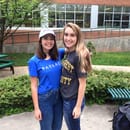Hi HerCampus! I am an editor here at Wake Forest University’s chapter of the website. My articles will focus on current political events and issues women face in todays world. The goal I have for my writing this year is to bring to light important topics that, I feel, need attention that pertain to women in our society. In the past I have written about access to birth control, sexism, and current events affecting women, which is just the beginning of a more focused writing campaign that I hope to continue into this semester.
For my first article of the new school year I want to point out women in science and how many of them have been over shadowed in the past. Jocelyn Bell Burnum was recently awarded the Special Breakthrough Prize in Fundamental Physics for discovering the first pulsars, forty-four years after her professor won the Nobel Prize for her discovery. After Bell Burnum alerted her PhD supervisor of what she had seen on readouts from her radio telescope, the two of them published a paper together, with her professor getting the credit and the prestigious award. This is not the only incident of a women being overlooked by the scientific field.
Rosalind Franklin, who discovered the Double Helix, was barely mentioned despite her noting the importance of a helix figure in an X-ray image known as Photo 51. James Watson, Francis Crick, and Maurice Wilkins were given the credit when Watson found Rosalind’s picture of the double helix and after realizing what it was, published his findings on it. At the time, Franklin had left the school where she was doing the work on DNA with Watson, Crick, and Wilkins, and part of the arrangement that allowed her to leave said she would not continue research on it, so she barely got any credit. The only credit she got was a complaint in Watson and Crick’s book about he not being able to interpret her findings. Later, Franklin worked on studying virus particles, making important discoveries about the tobacco mosaic virus and polio.
And let’s not forget to mention the amazing women who worked at NASA when it was known as NACA, National Advisory Committee for Aeronautics, calculating outcomes for all kinds of different technologies. Women worked as number crunchers, making their way through equations detailing functions of planes and contributing to the design of different military technology. Specifically, Christine Darden went to work on supersonic flight and Katherine Johnson calculated the trajectories for different space missions. These women were known as the West Computers, working as processers to further all the different projects for the space agency. Sadly, few of these women received academic writings for their work and usually only stayed at the agency for a few years until they got married or had children and society expected them to leave their job.
These are just a few examples of women in science who, throughout history, have been overlooked in their work, which have affected us in huge ways today. As more people become aware of these injustices, they will hopefully begin to understand the importance of supporting women who want to go into STEM jobs today.


